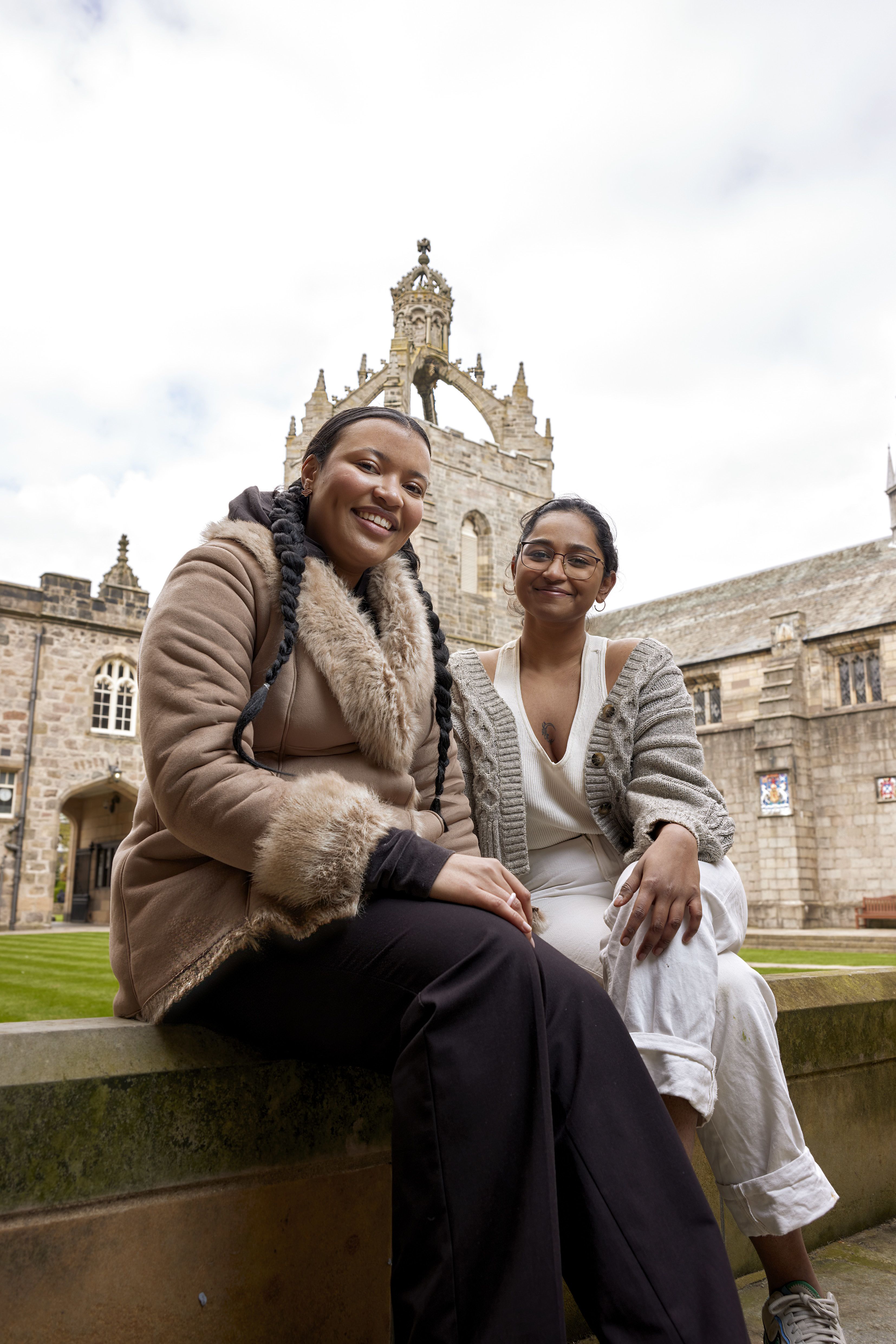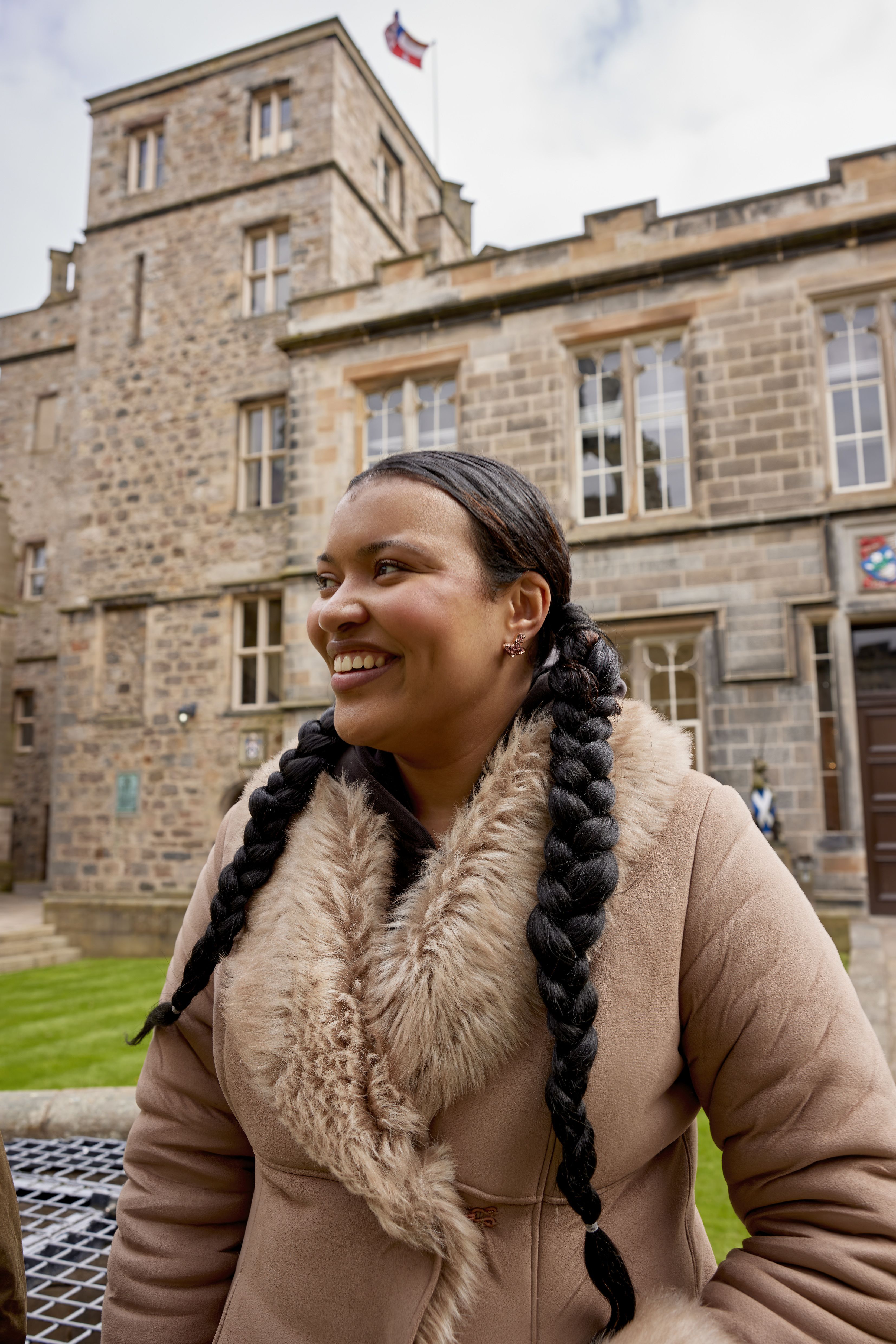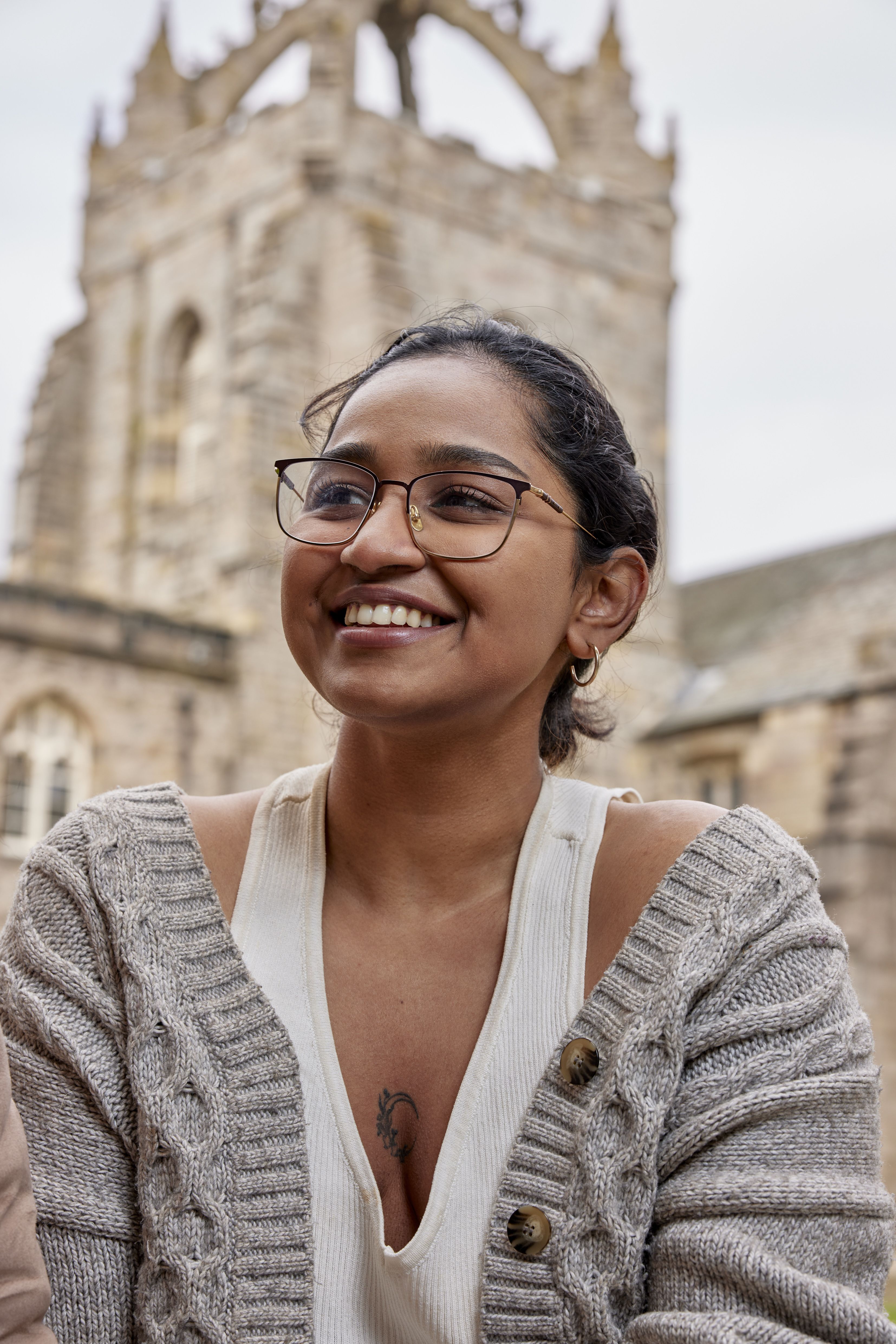BREAKING BOUNDARIES
for Equality
with Vanessa Mabonso Nzolo, AUSA Student President and Sai Shraddha S. Viswanathan, AUSA VP for Welfare

“The beautiful thing about womanhood is that there are so many ways to be a woman.”

What does breaking boundaries mean to you?
Sai: I think for me ‘breaking boundaries’ is about getting out of my comfort zone. I am very reluctant to feel vulnerable in public, and when I step out of my comfort zone and I get that feeling of vulnerability, it’s scary and uncertain but if I continue through it and go forward, I think that is pretty boundary breaking for me.
Vanessa: I think for me, I have a lot of perceived boundaries that I have set for myself. For example, I worry about what others think. Do they have a perception of what people who look like me, or come from where I come from, should be doing, or where they should end up? I used to think I just ‘ended up’ running for an election and in this role, but I realised that I have exceeded the boundaries that I had set for myself. I realised I could do these things and wasn’t held back by the perceptions of what I should or shouldn’t be doing.
Have you ever had a barrier that you felt you needed to overcome to get to where you are today?
Vanessa: We recorded a podcast recently with some of our students from the Black, Asian and Minority Ethnic Students Forum and they talked about the barriers we face in our roles as student officers because of where we come from or what we look like - that's definitely a boundary that we need to constantly overcome. But we are not just breaking that boundary, we are literally breaking the image and perception that people have of what people in professional roles look like and how they talk and contribute to conversations.
We often attend events with student officers from other Universities and this is a common theme among all of them. It’s something that we are working together on.
“We are not just breaking that boundary - we are literally breaking the image and perception of what people in professional roles look like and how they talk and how they contribute to conversations.”




Is there a particular person or thing that has helped inspire you or get you to get you where you are now?
Vanessa: My parents, definitely. My dad is a refugee and they've had to build a life from scratch and it has been really amazing to follow. They're hard-working people and they really deserve the world so I think they've always wanted to make sure that my brothers and I can do anything. They are boundary breakers themselves.
Sai: My Parents and especially my Grandmom. I come from India and I think my dad has a similar story to Vanessa’s. We come from the south of India and he moved to the big city with some change in his pocket with seven of his cousins. I've seen him come from nothing and make a success of it. We used to live in a tiny place and he and my family worked really hard. They have encouraged me to do so much and they've never let their personal opinions or their own experiences or the challenges they had to face affect me in any way. I really look up to them for that and I'm really grateful.
What kind of boundaries do you think that young women face nowadays?
Vanessa: I'd say the biggest thing is probably challenging personal bias and the way others see you. We’ve had a glimpse into the corporate and professional world now. We go into a lot of boardrooms and have conversations with people that normally we wouldn't have access to, and people do treat us differently. Then they realise ‘oh you're not just a student representative’ or ‘oh this is your job and you have the qualifications to do this’.
We should be extending opportunities to more people, particularly when it comes to recruitment. Sometimes people consider diversity to be just an add-on, or they think that inclusion is not an active practice everywhere. Some people think that if you recruit ‘diverse individuals,’ it means you're not focusing on the adequate skills for that role. But you can find professional people from all kinds of backgrounds while being committed to inclusion; challenging your own perceptions and recruitment processes. Organisations should take a closer look at their own surroundings; what does your membership look like and what kind of people are you recruiting. Is it really an inclusive environment? We are underrepresented as leaders and it's crazy that in 2024 we still have these conversations - often it can be women who have gone through sexism themselves who are then not considerate of inclusion in their own approach.
Sai: I feel like social constructs and the environment we live in puts so many limitations on young people's identities. Our identities are meant to be fluid and they are meant to be ours to own - yet sexism, racism and all the ism’s put a lot of limitations on young people. Young people have great aspirations and ideas of what they want to achieve, but then when they face the kind of experiences Vanessa just described, it limits those aspirations.
When we go into certain spaces and people’s heads turn because we are not expected to be there, or we’re not the same as everyone else, we feel we’re treated as a tick box just to mark diversity. When you add all that together it can be such a limiting feeling for a young person, and you feel like ‘oh am I just someone who is Indian or someone who is from a different country or who sounds different?’. It can take a toll on you and how confident you feel professionally and academically.
“We really wanted to highlight that there is no one-size-fits-all solution for student experience or for general well-being.”


What are some of the biggest issues that you are focused on at the moment in terms of social inclusion and cultural diversity?
Vanessa: Probably the biggest thing to us, because we come from an international background, has been the work we're doing around the international student experience. We have a campaign called Borderless which focuses on the international student experience across the UK We’re coming together with other university representatives and student unions to warn against the UK government’s strong statements and new policies around international visas. Not only does this lead to what is potentially being called a ‘hostile environment,’ it negatively influences attitudes across wider society.
In Scotland we've been really proud to be the leaders on this work with the National Union of Students (NUS) Scotland and it permeates all aspects of student experience, from inclusion to the academic experience.
Sai: A big part of the project is about community and creating support systems for international students to help them feel at home. We really wanted to highlight that there is no one-size-fits-all solution for student experience or for general well-being. What works for one demographic of student doesn't necessarily work for another. We’ve worked really hard to highlight this to our staff members and we're working towards creating a space that's truly inclusive for our international student communities.
We are also starting a student’s forum to provide a safe space for international students to discuss their experiences, their knowledge, and to make sure that we're empowering them to campaign on things that are important to them.
We have also done a lot of work at a national level. Last year we got the chance to share a parliamentary conversation about this with NUS Scotland and we managed to create a space for the very first time in an NUS UK level conference for international students to get the community started. We are also individually working on separate policies. Vanessa has worked on a policy on international students at the UK level which is going to be discussed at the NUS national conference, and I worked on a policy looking at the international students experience at a Scottish level. We have been doing a lot with very limited resources . Our CEO jokes that this is not a job it's a lifestyle and it really does feel like it because we live and breathe the student body and we live and breathe representation and student voice and that's something that we embrace.
What are you most proud of to have achieved in your time here?
Vanessa: One that really comes to mind is a phone call I was just having before this meeting with a candidate who's running a student officer position and they said ‘hopefully you don't mind me saying this but I think seeing someone that looks like me in your role has given me the confidence to run and I didn't think that someone like me could receive the support of the student body or be considered as a representative of students’. She is a Black woman and hearing that made me cry. So I hope just having representation at a student officer level makes a difference in the sense that it's not a shocking experience when there is a student officer who's not white and Scottish.
Sai: I think seeing people who look and sound like me when they come into the Union and they feel comfortable enough to just take part in events or not feel the need to switch from their own accents to something different really puts a smile on my face. I remember when I first came over here I really struggled and I think I only had like a couple of friends who I could really be my authentic self with but it's really refreshing to see more people from varying backgrounds come into these spaces and feel comfortable and safe, so that makes me really proud.
What advice would you give to young women looking to break boundaries themselves?
Vanessa: I think it is a combination of all the things we have talked about, having the confidence to just be yourself. I think the beautiful thing about womanhood is that there are so many ways to be a woman and it’s okay to figure it out along the way. There is no set way of being a woman and you don’t have to stick to one path, there is a fluidity in our identity. Even if you have only seen one type of women represented in a professional environment or in politics or in any area you want to get into I think it’s important to remind yourself that if you’re there then you are supposed to be there and someone else will really appreciate that you are in that role.
Sai: I think it’s important to step out of your comfort zone and to be vulnerable but it is also okay to take a step back and just want to take care of yourself sometimes and we don’t have to burn ourselves out. You can be a young woman at any point in your life by taking on new opportunities.
